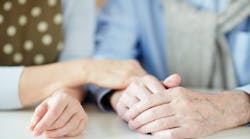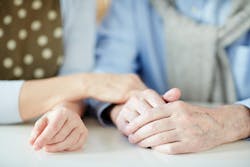Caring for our elders: A personal journey
Linda Meeuwenberg, MA, MA, RDH
I recently completed a podcast for MOMgienists with the podcast’s founders, Jasmin Haley, RDH, and Christie Lincoln, RDH, on the topic of work-life balance and caring for aging parents.1
MOMgienists’ goal is to reach hygienists who are mothers with topics of interest to them. I was honored to be invited and asked if I could discuss what I had learned while caring for my parents. Having presented several seminars on work-life balance, caring for elders added a whole new dimension to my presentations.
© Pressmaster | Dreamstime.com
Here are some eye-opening facts published by the Pew Research Center.
• There are 40.4 million unpaid caregivers of adults ages 65 and older in the United States.
• Adults ages 45 to 64 are the most likely to be caregivers. About a quarter (23%) of adults ages 45 to 64 care for an aging adult.
• Most caregiving for aging parents is not in the form of financial support or personal care. More commonly, adults help their parents with errands, housework, or home repairs.2
• Emotional support is a big part of caregiving. Most adults say they provide some emotional support for their aging parents, but more women say this than men. Fully 68% of adults say they do this at least sometimes, including about one-third who provide emotional support to their parent frequently. Some 39% of women say they provide emotional support frequently to an aging parent, compared with 30% of men.
• Most adults who have helped an aging parent see it as rewarding; relatively few say it is stressful. Among those who have helped their parents—financially, with errands, housework, or home repairs, or with personal care—88% say it’s rewarding. Roughly one-third (32%) of adults who have helped with any of these tasks say helping an aging parent is stressful.3
The sandwich generation
The term “sandwich generation” refers to those who care for aging family members while raising or financially supporting their own children. According to the Pew Research Center, nearly half (47%) of adults in their 40s and 50s have a parent age 65 or older and are either raising a young child or financially supporting a grown child (age 18 or older). About one in seven middle-aged adults (15%) is providing financial support to both an aging parent and a child.4
Most of us care for aging relatives at some point in our lifetimes. In our 20s, caring for our elders rarely crosses our minds as we are busy studying and building our careers. However, life throws curveballs. As a college professor in a dental hygiene program for 30 years, I had several students through the years who were faced with a family member who became seriously ill, or with an unexpected death. You can imagine the stress of someone who receives this bad news. Managing the stress of college studies while elder relatives need them at home is challenging and may require difficult decisions. None of us can predict when we will be put in this position.
For me, it wasn’t until I was in my 50s that my parents needed me as a medical advocate. Although I had advised them and reviewed their medications for chronic conditions over the years, I was needed in a more urgent position for my mother. As the oldest of five siblings, the only daughter, and with a career in health care, I assisted my mother who suffered for nearly two decades from debilitating rheumatoid arthritis.
Her physician noted that she would need spinal surgery to arrest the devastation to her frail body. She had already endured 12 surgeries to other parts of her deteriorating body. I went with my parents to a specialist. I listened as the specialist told us there was little she could do. The inflammation would continue to break down my mother’s spine and she would be faced with incontinence, respiratory issues, or death. It is a diagnosis no daughter wants to hear. The alternative was another surgery. The neurosurgery required a neurosurgeon and an orthopedic spinal specialty surgeon. Having had cervical spine surgery myself, I knew how serious this would be for my mother in her 70s. She chose the surgery.
Although I have four siblings, three of whom live near my parents, they’re brothers. They’re much younger than me and have demanding jobs and are raising their young children. They were helpful in ways other than medical advocacy. One was very good at home repairs and visited my parents weekly to fix various things around the house, while the others helped with yard work and emotional support.
Getting prepared
Prior to the surgery, I had the dreaded conversation with my parents about their wishes should they not be in a position to make those decisions. I especially wanted my parents together so that Mom could express how she wanted things managed if something should go wrong with the surgery. I also asked about their will or trust.
I learned that they had had a will for 15 years and that I was the executor, but they had never told me this. I didn’t have a copy and I didn’t know the attorney. We visited the attorney and updated the will and clarified details. There was a strong possibility that my mother would not live through the surgery and we wanted to be prepared. We then set about going over their bank accounts. The attorney advised them to put me on the accounts. I’m so glad we did this because I was able to write checks for them. Being the legal patient advocate and having power of attorney, I was able to discuss the course of treatment with my mother’s doctors.
If you have not had this conversation with your parents or other relatives you might be caring for, I suggest this be done as soon as possible. Knowing what their wishes are for the end of life is a challenging conversation, but very important. Also, make sure you have your own affairs in order. Do you have a will or trust? If you have minor children, who will you designate as a guardian? Don’t you want to choose rather than have a court decide for you?
Seek out local resources such as support groups of people who are experiencing the same challenges. I attended a seminar for caretakers sponsored by a local hospice organization. They provided us with notebooks to keep track of doctors, medications, personal information of loved ones, and more. Although overwhelming, it was extremely helpful to organize my parents’ affairs.
Unfortunately, we lost my mother six weeks after the surgery. Having everything organized was a huge help. During a time of grieving, it’s difficult to think clearly and remember the details of their personal affairs. Since my mother was the one who handled financial issues, my dad was grateful that I could help. The more you organize in advance, the smoother the time will be for you. We knew exactly how my mother wanted her end of life handled. Although they had purchased lots next to her parents at the cemetery decades ago, she wanted to be cremated with her ashes placed in the mausoleum. It’s a good thing I asked.
Self-care is extremely important when caretaking. Often the woman in the family is the one who takes on the most responsibility, whether for her own aging parents or her spouse’s parents. With the additional credential of being in the health-care industry, we hygienists are the perfect choice. Meeting the challenge of caring for your family and going to work can put you at risk for health issues. Not only can you experience physical health issues, but emotional issues can also become overwhelming. I had a good support system and sought professional counseling. I learned how to breathe deeply and relax. Running on adrenaline can keep you from sleeping properly and lead to exhaustion. And, I was fortunate to have medical leave during this very difficult time.
No one is prepared for the challenging time of losing parents. I was so shocked when I got the call that my mother had passed in her sleep. My family had weathered the storm of my mom’s surgery and rejoiced when she pulled through. I was to take her back to the surgeon to have the halo traction removed from her head in a few days. Instead, I was delivering her eulogy as we laid her ashes to rest that day.
My father lived for seven more years before I was called to his side. Difficult decisions regarding his driver’s license occurred as he experienced syncope for no reason. By this time, I had moved to Florida and he was in Michigan. I spent three summers caring for him. Included in his care were meal preparations, housekeeping chores, medication management, enrollment in the VA medical system, and changing his family doctor to a gerontologist. I was much better prepared to care for him after going through the death of my mother.
One of the things my father had always wanted to do was visit the WWII memorial in Washington, DC. He would never leave my mom to take the trip. I made sure we did this shortly after my mother passed. As a frequent flyer, I was even able to get him upgraded to a first-class seat. It was a very emotional trip. While there he was part of a PBS documentary being filmed, The Vanishing Voices of WWII. My mother never wanted to hear about his war experiences. He was a floodgate of stories he had kept to himself all those years. I’m thrilled that I could be part of this experience with him.
I urge you to take the time to plan for your elders’ end of life. Like I did with my father, offer to fulfill their big dreams. He died from leukemia within a few months, and we never had to take his car keys. My father was honored as a veteran by the Hospice House. He was the first one honored by this new program, and he received a pin and certificate. He never lost his sense of humor. As the hospice administrator placed the pin on his shirt, he jumped and said, “Ouch!” Then he laughed as she looked horrified. Our family laughed with him. Way to go, Dad!
References
1. Airway and Myofunctional Therapy. MOMgienist podcast. http://momgienists.libsyn.com/. Released October 3, 2018.
2. Stepler R. 5 facts about family caregivers. Pew Research Center Fact Tank. http://www.pewresearch.org/fact-tank/2015/11/18/5-facts-about-family-caregivers/. Published November 18, 2015.
3. Parker K, Patten E. Emotional Ties. Pew Research Center Social and Demographic Trends. http://www.pewsocialtrends.org/2013/01/30/emotional-ties/. Published January 30, 2013.
4. Parker K, Patten E. The sandwich generation. Pew Research Center Social and Demographic Trends. http://www.pewsocialtrends.org/2013/01/30/the-sandwich-generation/. Published January 30, 2013.
Linda Meeuwenberg, MA, MA, RDH, is the founder and CEO of Professional Development Association Inc., specializing in continuing education and keynote addresses that help professionals improve their performance. She spent three decades as an educator and holds the title of professor emerita at Ferris State University, her alma mater. She holds several awards, including the 2018 Distinguished Alumna from her alma mater, the Swann D. Knowles Achievement Award from the Florida Dental Hygiene Association, and the Sunstar Award of Distinction. Meeuwenberg has participated in three collaborative books since retiring from education. To learn more, visit lindapda.com.

